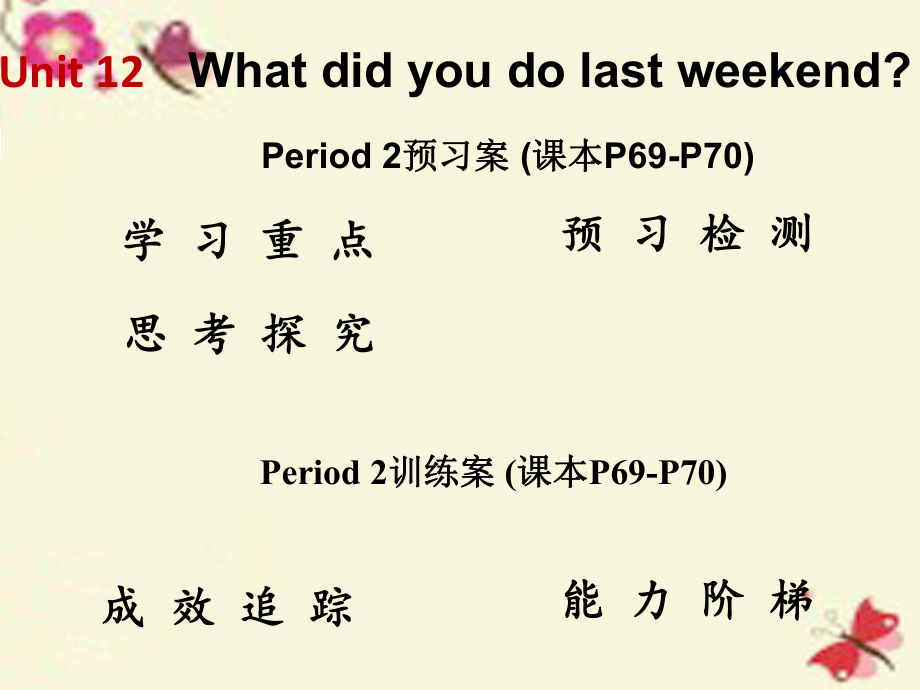《【高分突破】2016七年級(jí)英語下冊(cè)Unit12WhatdidyoudolastweekendPeriod2課件(新版)人教新目標(biāo)版》由會(huì)員分享���,可在線閱讀��,更多相關(guān)《【高分突破】2016七年級(jí)英語下冊(cè)Unit12WhatdidyoudolastweekendPeriod2課件(新版)人教新目標(biāo)版(16頁(yè)珍藏版)》請(qǐng)?jiān)谘b配圖網(wǎng)上搜索�����。
1����、學(xué)學(xué) 習(xí)習(xí) 重重 點(diǎn)點(diǎn)預(yù)預(yù) 習(xí)習(xí) 檢檢 測(cè)測(cè)思思 考考 探探 究究Period 2預(yù)習(xí)案預(yù)習(xí)案 (課本課本P69-P70)Period 2訓(xùn)練案訓(xùn)練案 (課本課本P69-P70)成成 效效 追追 蹤蹤能能 力力 階階 梯梯Unit 12 What did you do last weekend?學(xué)學(xué) 習(xí)習(xí) 重重 點(diǎn)點(diǎn)1.單詞: away, mouse(mice), baby(babies), shout , language,fly(flew), kite, woof2.短語:run away, shout at, fly a kite3. 語言目標(biāo): -What did you/he/she
2��、/they do last weekend ? - I/We/He/She/They went boating -Who visited her grandma ? - Mary did.-Where did you/ he/she/they go last weekend? - I/ He/She/They went to the library.學(xué)學(xué) 習(xí)習(xí) 重重 點(diǎn)點(diǎn)-Who did you/ he/she/they go with? - I/He/She/They went with my/ his/ her / their friend.預(yù)預(yù) 習(xí)習(xí) 檢檢 測(cè)測(cè)一��、請(qǐng)根據(jù)中文意思寫出下列
3、單詞����。(這些都是黑體單詞,要好好記住哦��。)1. _ adv. 離開����;遠(yuǎn)離2. _ v. 呼叫;喊叫 3. _v. 飛 4. _ n. 嬰兒adj.幼小的5. _ n. 語言6. _ n.老鼠;耗子 _ pl.7. _n. 風(fēng)箏8. _ interj. ( 狗叫聲)汪汪awayshoutflybabylanguage mousekitemicewoof預(yù)預(yù) 習(xí)習(xí) 檢檢 測(cè)測(cè)二��、請(qǐng)認(rèn)真閱讀課本���,找出以下短語���。9. 跑開_10. 放風(fēng)箏 _11. 沖大聲叫嚷_12. 去農(nóng)場(chǎng)了_13. 唱歌和彈吉他了 _14. 和朋友吃晚餐了 _15. 在游泳池游泳了 _16. 去圖書館了_run awayfly a
4、 kiteshout atwent to a farm sang and played the guitar had dinner with friendsswam in the swimming pool went to the library預(yù)預(yù) 習(xí)習(xí) 檢檢 測(cè)測(cè)三����、熟讀Grammar Focus,完成下列句子���。17. 你上周末干了什么?(What)_18. 我們?nèi)澊? (went boating) _19. 誰看望了她的奶奶����?(Who)_20. 她上周末去哪里? (Where)_21. 她和誰一起去?(Who)_ What did you do last weekend?We wen
5����、t boating.Who visited her grandma? Where did she go last weekend?Who did she go with?思思 考考 探探 究究It is + 形容詞+(for sb.)to do sth.句型的用法:It is + 形容詞+(for sb.)to do st. 結(jié)構(gòu),意為“_”, it 是句子的形式主語����,真正的主語為后面的不定式。1)學(xué)習(xí)英語是很重要的����。_ very important _ English.2)和同學(xué)踢足球是很讓人放松的��。_ with classmates. shout to和shout at有什么區(qū)別shout
6��、_有罵人的意思�����,近距離向?qū)Ψ酱舐暯腥聅hout _指遠(yuǎn)距離大聲叫喊,想要對(duì)方聽見����。3) The boy _ me for help. It is對(duì)某人來說做某事對(duì)某人來說做某事.to learnIts very relaxing to play football atto shouts to 4) Its impolite to _ the old.動(dòng)詞過去式不規(guī)則變化之一: “AA 制” 動(dòng)詞的一般過去式����,有規(guī)則變化和不規(guī)則變化���。而在這些不規(guī)則變化中���,實(shí)際上又隱藏著規(guī)則。這里的AA表示動(dòng)詞原形與動(dòng)詞過去式一致���。這些動(dòng)詞有:putput, cutcut, let_, cost_, hurt_,
7���、 read_, beat_(注意:read寫法相同,讀音不同�����。其它寫法和讀音都相同��。) shouts atletcosthurtreadbeatdt: build builtught: buy boughtcatch caught eep ept: keep kept send _ spend _bring _think _ fight _teach _sleep_ sweep _動(dòng)詞過去式不規(guī)則變化之二:sentfoughtspentbroughtthoughttaughtsleptsweptPeriod 2訓(xùn)練案訓(xùn)練案 (課本課本P69-P70)成效追蹤成效追蹤一般過去時(shí)的基本結(jié)構(gòu):肯定句
8����、:主語+動(dòng)詞過去式+其他。或者主語+was/ were+其他��。e.g. I played tennis last weekend. 我上周末打網(wǎng)球了1. My school trip _great. 我的學(xué)校郊游棒極了���。否定句:主語+didnt+動(dòng)詞原形+其他�����,或主語+wasnt/ werent+其他��。2. He _ computer games yesterday.他昨天沒有玩電子游戲����。wasdidnt playPeriod 2訓(xùn)練案訓(xùn)練案 (課本課本P69-P70)成效追蹤成效追蹤一般疑問句:Did+主語+動(dòng)詞原形+其他����? 肯定回答:Yes, 主語+did ; 否定回答:No, 主語+di
9�����、dnt. 或者was/were+主語+其他���? 肯定回答:Yes,主語+was/were; 否定回答: No, 主語+wasnt/werent.3. -_ go to the beach?-Yes���,_./ No, _.-你們?nèi)ズ┝藛幔?-是的��,我們?nèi)チ恕?不����,我們沒去���。特殊疑問句:特殊疑問詞+ 一般疑問句(順序)����?Did youWe did We didnt Period 2訓(xùn)練案訓(xùn)練案 (課本課本P69-P70)成效追蹤成效追蹤4. -_ Li Lei do last weekend? -He visited his grandparents.-李雷上個(gè)周末干什么了�����? -他看望了他的祖父母���。
10����、5. -_you yesterday? -I was at home.-你昨天在哪兒��? -我在家里What didWhere were 一、單項(xiàng)選擇( ) 1. - Do you know who took the students to the old peoples home, Tony?- Well, Mr. Smith _. (2013.湖北宜昌) A. took B. does C. did D. do( ) 2. -When did you have your school trip? - _. (2013. 山東濟(jì)南) A. In five days B. For five da
11���、ys C. Twice a day D. Five days ago能能 力力 階階 梯梯CD( ) 3. - _ did you pay for the CD? - Only nine dollars. (2012. 廣東) A. How many B. How much C. How longD. How often( ) 4. - _ did you visit the Science Museum? - Three months ago. (2012. 重慶) A. How many B. When C. How longD. How often能能 力力 階階 梯梯BB( ) 5.
12����、Is there _ in todays newspaper ? (2012. 日照) A. anything importantB. important anything C. something importantD. important something能能 力力 階階 梯梯A三���、用所給詞的適當(dāng)形式填空����。6. Look, there are many _ (mouse) under the sofa.7. Tom _ ( fly) a kite in the park yesterday.8. How many _ (language) can you speak?9. We shouldnt _ (shout) at our classmates.10. The mouse _ (run) away quickly when it saw the cat.miceflew能能 力力 階階 梯梯 languagesshoutran
 【高分突破】2016七年級(jí)英語下冊(cè)Unit12WhatdidyoudolastweekendPeriod2課件(新版)人教新目標(biāo)版
【高分突破】2016七年級(jí)英語下冊(cè)Unit12WhatdidyoudolastweekendPeriod2課件(新版)人教新目標(biāo)版

